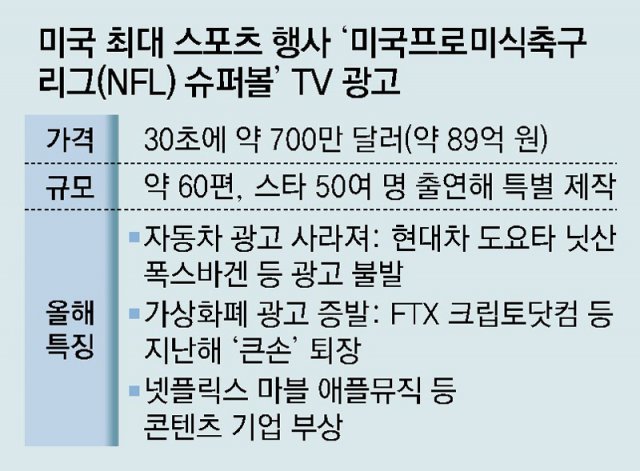8 car companies last year → 3 this year
Analysis of “cost reduction for electric vehicle investment”
Self-driving advertisements targeting Tesla
On the afternoon of the 12th, when the ‘Super Bowl’, the North American Professional Football League (NFL) final, the largest sports event in the United States, was held, the entire United States was in a festive mood. As it has become a tradition for families and friends to gather and watch TV broadcasts from door to door, the number of Super Bowl viewers is between 100 million and 200 million.

The Super Bowl is called another event not only for the results of the game, but also for TV commercials watched by hundreds of millions of viewers in the United States and around the world. The unit price of a 30-second advertisement reaches 7 million dollars (approximately 8.9 billion won). Considering the cost of producing advertisements, Super Bowl advertisements, which cost tens of billions of won per episode, are used as a measure of the global industrial landscape. In this year’s Super Bowl TV commercials, advertisements for traditional ‘big players’ automobile companies have been drastically reduced, and advertisements for virtual currency companies, which were new big players, have also disappeared.
The only automobile companies that appeared in the Super Bowl commercials that day were Kia General Motors (GM) and Stellantis. Last year, eight companies including Hyundai Motor, Toyota, Nissan and BMW decreased by more than half. In last year’s Super Bowl advertisement category by industry, the automobile industry was overwhelmingly number one with a total of 99.3 million dollars (approximately 127 billion won).
CNBC, a US economic channel, analyzed that “the process of converting production to electric vehicles requires huge investment costs for automobile companies, but the economy is slowing down, so it is due to the effect of cost reduction.” As the base interest rate in the US soared last year and funding costs also soared, overall marketing costs are on the decline. In fact, Hyundai Motor, Toyota, and others said that it was a “decision based on business priorities” regarding the background of not running Super Bowl advertisements this year.
As the popularity of used cars increased last year due to bottlenecks in the automobile supply chain, used car companies including Cabana, which advertised in the Super Bowl, were unable to participate this year. Cabana cut about 4,000 jobs from last year to January this year due to lost revenue and rising debt costs.
Nevertheless, there was a person who participated in the Super Bowl by producing an advertisement targeting Tesla at their own expense, drawing attention. Dan O’Dowd, famous as the ‘Tesla sniper’, is the CEO of Greenhills Software. The advertisement created by CEO O’Dowd was sent to the Super Bowl advertisement in some regions, including Washington, the capital, as a campaign to publicize the unsafety of Tesla’s self-driving.
In the midst of a series of bankruptcies following the bankruptcy of FTX, the world’s third-largest cryptocurrency exchange last year, virtual currency companies disappeared altogether. When virtual currency advertisements dominated the Super Bowl last year, the US Senate criticized them as “dangerous advertisements that did not explain the potential risks to investors.”
Advertising positions where cars disappeared were filled by traditional consumer goods companies such as alcoholic beverages, snacks, and other content companies, including Netflix, which maintained solid performance despite inflation. In particular, Netflix collaborated with GM Michelob Ultra to provide its own content as an advertising stage. In the 60-second commercial for GM, comedian Will Ferrell rode a GM electric car through Netflix’s popular dramas ‘Bridgerton’, ‘Squid Game’ and ‘Army of the Dead’. Heineken collaborated with the Marvel superhero ‘Ant-Man’ to showcase a special advertisement for non-alcoholic beer.
The halftime show that draws as much attention as the game featuring the best pop stars has changed its sponsor from Pepsi to Apple Music. This year, Rihanna, who returned to the stage after 5 years, was the main character. The Wall Street Journal (WSJ) analyzed that Apple Music’s decision to pay 250 million dollars (approximately 319.1 billion won) over 5 years and become a halftime show sponsor seems to be a strategy to actively target the music streaming service market that has been pushed behind by Spotify. did.
New York =
Source: Donga
Mark Jones is a world traveler and journalist for News Rebeat. With a curious mind and a love of adventure, Mark brings a unique perspective to the latest global events and provides in-depth and thought-provoking coverage of the world at large.